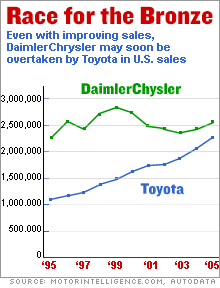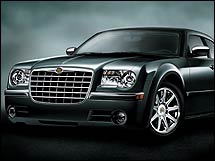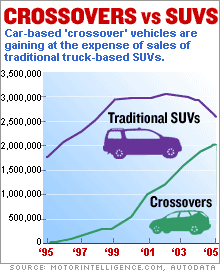|
GM, Ford woes could bite Chrysler next
Despite gain in sales, profits in '05, No. 3 Chrysler isn't clear of problems facing its Detroit-based rivals.
NEW YORK (CNNMoney.com) - While its Detroit rivals struggle with falling U.S. sales, deep losses and plant closing announcements, everything seems to be going well for Chrysler Group. But some experts say that the problems that have bitten General Motors Corp. (Research) and Ford Motor Co. (Research) so hard could be just around the corner for the North American unit of DaimlerChrysler (Research). Company executives concede the company's economic outlook is closer to that of its Detroit rivals than its Japanese competitors. At first blush, everything seems to be fine at Chrysler. It saw U.S. sales increase 4.4 percent in 2005; GM and Ford both had sales fall almost 5 percent. It has an investment grade credit rating; GM and Ford have been downgraded to junk bond status and their executives have been forced to repeatedly answer questions about whether bankruptcy lies ahead. Perhaps most importantly, Chrysler Group made $1.3 billion in the first three quarters of 2005, while GM lost $5.6 billion from its North American automotive operations in 2005, excluding special items. Ford lost $1.6 billion on a pre-tax basis excluding special items, on its North American auto operations in 2005. But DaimlerChrysler's credit rating is only a couple of steps above junk bond status itself. And some analysts raise questions about the strength of both its profits and its sales. "They're not making anywhere near the money they need to be making," said David Cole, chairman of the Center for Automotive Research, who points to issues such as retiree health care costs and limited flexibility for its factories to switch between products. "The only reason we're not talking more about them is because they don't have as serious a problem as GM or Ford." Sales not as strong as they appear
The experts say that the problems at GM and Ford could show up at Chrysler relatively quickly if its sales slump even slightly. And some question whether Chrysler's sales and product line-up are nearly as strong as they appear. Estimates from the Power Information Network, a unit of J.D. Power, show Chrysler's nearly 100,000-vehicle increase in U.S. sales in 2005 is due to less-profitable fleet sales to customers such as rental car companies and other commercial and government customers. The numbers suggest that Chrysler's retail sales to consumers slipped slightly, as did its share of total U.S. retail auto sales. Chrysler spokesmen won't comment on their fleet sales or their share of the retail sales markets, nor will they give forecasts for where they expect sales to be in 2006. Chrysler is helped by strong gains for its critically acclaimed 300 sedan, which debuted in 2004. It also had gains in sales of its new Dodge Charger, which hit showrooms in 2005, as well the new Town and Country minivan. But some experts say the strength of the 300, which had sales of 144,068 in 2005, have disguised weaknesses in its overall lineup. Chrysler Group has relatively weak sales and offerings of so-called crossover vehicles, the car-based SUV segment that has become the hottest slice of the U.S. car market. This year, sales of crossovers are expected to top sales of the traditional SUVs that have been a staple of Chrysler Group. Chrysler Group's crossover sales growth has lagged behind the overall segment recently. It has only three vehicles in the segment -- the PT Cruiser, the Pacifica and the Dodge Magnum, and together they finished fourth, behind GM, Ford and Toyota (Research) and just barely ahead of No. 5 Honda (Research). And unlike rivals, it didn't have any new offerings in the segment unveiled at the recent Detroit auto show. Relatively old model lineup
Michael Bruynesteyn, auto analyst for Prudential Equity Group, estimates that in terms of time since their last design, Chrysler will have a relatively old lineup of vehicles in the coming years, even though Chrysler says it plans to roll out 10 new models in 2006. Bruynesteyn estimates that the average age of the Chrysler Group vehicle sold this year will be 3.4 years, better only than Ford's 5.0 year average. GM's average age will be 3.0 years, according to the estimate, while Toyota and Honda will have 2.1 and 2.5 year averages, respectively. It will continue to trail GM until 2008, according to Bruynesteyn's estimates. "The weakness of Ford and GM has kept the microscope off of Chrysler," said Walter McManus, director of the Office for the Study of Automotive Transportation at the University of Michigan. "But they're also lagging the Japanese how fast they are getting new product out. Their product portfolio is not adequate. The 300 was a hit but the downside of the hot niche product, they have a short shelf life." Chrysler could even lose its long-held position as the nation's No. 3 automaker as soon as this year. Toyota Motor had U.S. sales of 2.3 million in 2005 and it projects a 5 to 10 percent sales growth here in 2006. DaimlerChrysler's sales, which includes Mercedes, came in at 2.5 million in 2005. Health care battle may loom
Ironically, Chrysler's recent profitability could work against it in the next couple of years if it makes it tougher to win the same concessions on health care that the United Auto Workers recently granted to GM and Ford. "It's going to be far tougher to win changes there than it was at Ford, where it barely passed," said Cole. Chrysler Group spent about $2.2 billion on health care for its active and retired employees and their families in 2005, up from $1.9 billion in 2004. The savings GM and Ford won would be worth $600 to $800 per vehicle sold by Chrysler, according to Cole. "It's absolutely necessary they get an adjustment on their health care," said Cole. "If they don't, they'll not only face a competitive disadvantage compared to the Japanese automakers, they face a disadvantage against GM and Ford as well." Neither UAW or Chrysler would comment on the record about whether there are talks about concessions going on, but a Chrysler spokesman did say the company needs the same kind of package as won at GM and Ford. "There's no difference in the economic climate that Chrysler faces than the one that Ford and GM face," said Chrysler spokesman David Elshoff. "All three of us are in an entirely different boat than transplant operators. All three have legacy costs. All three of us have made commitments to our work force and our retirees that haven't manifested themselves with the transplants." Elshoff said Chrysler is hopeful it will be able to get some help from the union. "We would expect that if the UAW is working with GM and Ford to address health care issues for their work force, based on a history of pattern bargaining, they would pursue similar talks with us," he said. Cole said DaimlerChrysler leadership is aware of the challenges it faces and he still believes that it should be able to avoid the financial situation now facing GM and Ford. He points to the announcement this week that DaimlerChrysler will trim 6,000 white collar jobs, mostly in Europe, as proof that company management is working on its challenges. But Cole said that the sudden onset of the problems at GM and Ford in 2005 shows how fast fortunes can change in the industry today. "They're not home free," said Cole. "They've been a little separated from the recent pain, but not by very much. It [a financial crisis at Chrysler] is a very major concern for the top executives there." _________________________ For a look at the plant closing plans announced at Ford, click here. For a look at GM's plant closing plans, click here.
For more news on autos and automakers, click here. |
|




